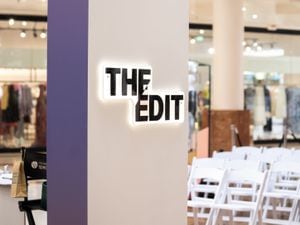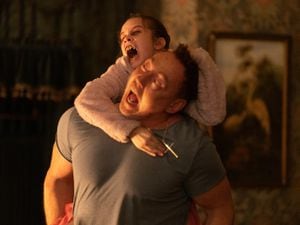Lucy Porter talks ahead of gig at Birmingham Glee Club
Big name comics Lucy Porter and Rhys James will test out material for their forthcoming Edinburgh shows when they play an intimate gig at Birmingham’s Glee Club.
They’ll feature on Wednesday with a show that promises to be unpolished but very funny, giving fans a great opportunity to see them work through their material before unveiling their shows in August. Tickets are just £10.
Lucy’s fresh from the success of her latest show, Consequences, which was a hit around the UK. It was a show about aging and about how much she’d let my sixteen-year-old self down. The show was called Consequences because Lucy realised all the things she thought she’d be doing in adulthood when she was 16 are things she was not doing at the age of 43.
“I’m not married to Morrissey, I’m not living in America, and I’m not driving a classic car.”
Lucy hoped to work in media when she was a teen, though she had very different ambitions back then.
“Well, my 16-year-old self wanted to be a war correspondent like Kate Adie, and was very serious and political and earnest. So I think she would have thought being a comedian was a terribly frivolous, wasteful, lightweight thing to be, which is completely true. But I’m pretty pleased. I think I’m probably having a more fun time than I would have done if I were Kate Adie.
She particularly loved comedy and as a child watched TV comedy shows as well as listening to programmes on the radio. “I was a bit of a comedy nerd, but I never really thought about doing it. But then I was at university and wanted to be a serious journalist or writer, and I realised that everything I wrote seemed to make people laugh. I thought, let’s make a virtue of that weakness.”
Each time she visits Edinburgh, she goes through a lengthy process of creating new material. Themes for her shows suggest themselves and very much depend on what she’s doing at any particular time.
“The themes completely suggest themselves. I look back over my 11 solo shows, and there’s been ones about luck, ones about happiness, ones about love. It’s a good document of what the things are that are really weighing on my mind at the time . . .”
Lucy starter her career after graduating from Manchester University in English Literature and working as journalist at The Big Issue in The North. She got a job as a researcher for Granada TV and worked on The Mrs Merton Show, before making her stand-up debut at a comedy club in Chester. The profession has changed a lot since then and comedy is now less of a boy’s club.
“I look back at my university life with a degree of horror, really. We lived in the most horrific house with six of us sharing. It was squalid, none of the plumbing worked . . . I had a little Mini Metro car, which the local children used to break into to eat chips and have sex. We’d come back and find that these teenage orgies had taken place in our house while we were out. It was just really depressing that these teenagers were having a much better time than we were. At the time it was awful, but you look back and you have a more sanguine approach to these things.
“Comedy’s been getting steadily better as the years have gone by. At the Edinburgh festival we’re still not at 50/50 representation, but about a third of the acts now are women. Crucially, audiences aren’t as surprised by seeing a female comedian.”
Observational comics led her into the profession and she still has a number of heroes who provide inspiration for her work.
“My earliest influences were people like Dave Allen. We always watched him on telly in our house, so his easy, conversational style was something I picked up early on. Victoria Wood was on TV when I was younger, and again, I loved her down to earth, relaxed demeanour. Caroline Aherne was a huge influence; I went to Manchester University, and when I left the first job I got was working on The Mrs Merton Show for Caroline. She was just fantastic.”
Lucy is one of the shortest performers on the circuit and has a long-held view that tiny people are funnier.
“I can absolutely confirm that. My husband is 6’5” and he’s not funny at all. If you have any physical abnormality or deviation from the norm, you often use humour as a coping mechanism. Being short, you want to get to the joke before other people do . . . When I started doing stand-up, I looked incredibly young. People were aghast, they thought some sort of work-experience child had come on stage to check the mic. I learnt very early on that I had to disarm the audience before they pounced on me.”
She has a number of favourite jokes – including one about the joys of aging: “There’s a joke I love and hate. A woman’s looking in the mirror, and she turns to her husband and says, “Darling, I look old, fat, and ugly. Give me a compliment.” He says, “well, your eyesight’s spot on”. Given that my show’s all about aging, that’s a horribly accurate joke.”
Rhys James, meanwhile, is still cutting his teeth having made an impact on social media and in comedy clubs.
He says being online can lead to problems – but those should be embraced.
“The best way to not offend anyone on Twitter is to delete your account. Even then you run the risk of offending Milo Yiannopoulos, who recently had his account deleted. The fact you even have that choice is an honour. Check your privilege. Even if you’re being ironic and you explain that critics might’ve had a sense of humour bypass, should you really be joking about bypasses? Or senses? Some people are blind . . .”





